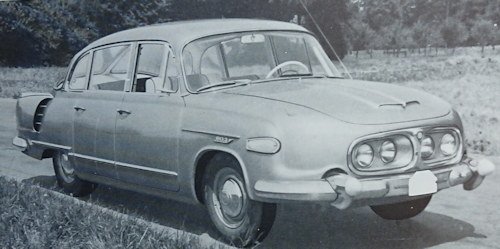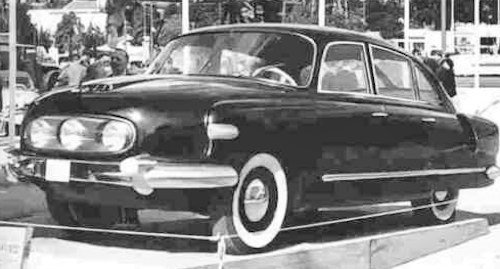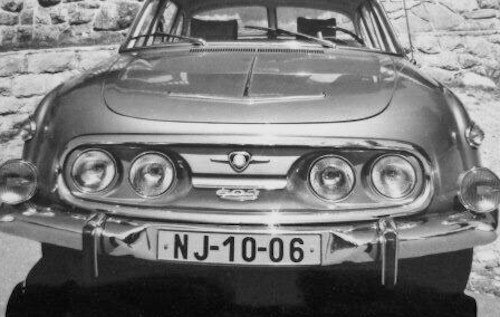Tatra 603
 |
|
|
Production : |
1956 to 1975 |
|
Class: |
Luxury car |
|
Body versions: |
limousine |
|
Engines: |
Gasoline:2.5 litres (70-77 kW) |
|
Length: |
4975 mm |
|
Width: |
1895 mm |
|
Height: |
1530 mm |
|
Wheelbase: |
2750 mm |
|
Curb weight: |
1470 kg |
The Tatra 603 is a luxury car of the Czechoslovak car manufacturer Tatra. It was produced from 1956 to 1975 in three series.
History
The Tatra 603 continued the tradition of streamlined styling at Tatra, which dates back to Hans Ledwinka. Another special feature was the air-cooled V8 engine in the rear of the car. Thus, the Tatra 603 stood out, both technically and externally, significantly different from other passenger car models. As a representative vehicle of the upper class, it was in the Eastern bloc high-ranking persons and organs of the society by allocation at the disposal.in Czechoslovakia the production of luxury passenger cars was considered needed. In addition, the government now recognized that the construction of luxury cars was quite a question of national prestige, and therefore granted Tatra in 1953 permission to produce new luxury cars.
The Tatra 603 was exported from the early 1960s to numerous countries in the socialist economic area. Mostly he was assigned to appropriate persons and organs for official, representative purposes. In Czechoslovakia were the higher functionaries of the Communist Party, senior civil servants, directors of the larger state enterprises as well as authorities and Czechoslovakian intelligence agents. The T 603 was also state body of Czechoslovakia and was available to the government members and diplomats. However, the president was not chauffeured with this vehicle, but settled in stretched Soviet limousines by GAZ drive. A few older specimens were used as a repainted emergency vehicle by firefighter commanders. From the civil service outdated specimens often came into private hands. Few copies were used in some cities of the CSSR in private hands as a taxi. In the course of their mission, many vehicles were sent to the factory for overhaul, where they received some of a new body and older versions were often upgraded to the current state. Exports to the East began in late 1959. Before the fall of the Iron Curtain in 1989, the T 603 was a rarity in the West. After 1990, many of these cars were privately exported to the West.

The model’s name Tatra 603 is derived from the engine type 603, which was designed differently than the newly designed body in 1949. This new engine was albeit modified accordingly in 1950 in the GP racing car Tatra 607 Monoposto and 1951 in 601 Tatra plan Monte Carlo for use in motorsport and was therefore proven and proven. The T 603 was the last Tatra to have a streamlined bodywork. With his predecessor T 87 he had only the basic principles in common (air cooling, Rear-engine, rear-wheel drive, swing axle rear), but has been completely redesigned. The central fin on the rear of the car, which featured the pre-war T 77 and T 87 prototypes in the 1955 prototype, was not included in the series. One style feature is the air intake hoses needed for air cooling, which are integrated into the rear wheel arches. A special feature of the first series (1955 to 1963) were the three main headlights of the same size behind a bodywork shaped vaulted glass cover, which was chosen to optimize the aerodynamics of the body.
The work on the new Tatra 603 began in the early 1950s in secret form in a design office in Prague. During this time, the construction of the first prototypes began. The government wanted a six-seat car and a 3.6-liter V8 rear engine within half a year. In the years 1954 and 1955, a large-capacity sedan based on the Tatra 603 under the name "Tatra 707" was designed, but never realized even as a prototype. Was developed a completely new large car with aerodynamic body, an air - cooled V - eight - cylinder engine in the Rear (603F version) with a displacement of (initially) 2545 cc, OHV - valve control and a power of 95 HP (73 kW).
The car was presented in 1956 at home and abroad to the public with the beginning of mass production. The initially 95 and later 105 hp engine accelerated the big car up to 165 km / h (first series 170 km / h), which not least made the streamlined bodywork possible. Since 1962, a new engine version was installed (603G), which had a slightly reduced to 2474 cc engine displacement, but increased by 10 hp performance. The Tatra 603 had despite the Hecktriebsatzes a largely uniform weight distribution (distribution of weight 45% front axle, 55% rear axle). The T 603 is easy to steer despite the lack of power steering and still convinces with good suspension comfort. The performance was impressive and make the 603 still a fast-touring car.
PERFORMANCE:
- Engine Capacity: 151.19 cu In, 2472 cu cm
- Fuel Consumption: 21.7 m imp gal, 18.1 m/US gal, 13 1 100 km
- Max Speed: 100.6 mph, 162 km h
- max power (SAE): 125 hp at 4800 rpm
- max torque (DIN): 112 1b ft, 15.5 kgm at 3000 rpm
- max number of engine rpm: 5000
- specific power: 50.6 hp/l
In 1963, the car was modernized to type 2-603. The most noticeable change was in the front of the vehicle, where the front three headlamps behind the glass cover were replaced by four smaller narrow headlamps with no further cover. As a result, the front of the T 603 was slightly rugged, which increased the air resistance; the top speed dropped by 5 km / h despite the slight increase in output. Further smaller optical retouching’s on the body followed. The middle headlight served until then as cornering light, but caused space problems in the trunk, which was located at the front, since the engine was placed in the rear.

1968 was followed by another revision, with a new and more stable engine version (603H) installed and the four headlights were slightly further outward. This version to be called Tatra 3-603. However, because of the high financial expenses for homologation, it remained officially known as Tatra 2-603 (Type 603-2). For distinction, however, the car was often called Tatra 603-2 model in 1969. Again, minor changes have been made to the bodywork. Most striking were the front, the chrome strips on the side (now arranged continuously and set higher) and the new, simplified, tapered in the centre instead of previously arched hubcaps.

The T 603 was also used in motorsport. Factory teams appeared at the Monte Carlo Rally, the Marathon de la Route and other international racing events, as well as national Czechoslovakian championships. Once, the Tatra team even managed to win the Marathon de la Route with a performance-enhanced T 603 of the first series, which was upgraded to 190 hp. The last racing versions were the Tatra 603 B5 in 1965 and the Tatra 603 B6 in 1968. At an Austrian Alpine rally, five vehicles started and were the first to arrive in succession.
The production of the T 603 ended in 1975, after a year ago the more modern and stronger successor 613.From 1956 to 1975 20,422 copies were mostly made by hand in twenty years; Thus, this model represents the most frequently produced passenger car type of Tatra. The Tatra 603 was also the last passenger car produced in Kopřivnice. Successor to the T 603 was from 1974 the Type 613.
Technical
-
Tatra 603 Technical details and specifications (1956-1975)
ENGINE:
rear, 4 stroke
cylinders: 8, Vee-slanted at 90°
bore and stroke: 2.95 x 2.75 in, 75 x 70 mm
engine capacity: 151.19 cu in, 2472 cu cm
compression ratio: 8.2 : 1
cylinder block: light alloy
cylinder head: light alloy
crankshaft bearings: 5
valves: 2 per cylinder, overhead, Vee-slanted at 90°, with push rods and rockers
camshaft: 1, at centre of Vee
lubrication: gear pump, filter in sump
lubricating system capacity: 5.7 imp qt. 6.9 US qt,
carburation: 2 Jikov 30 SSOP downdraft twin barrel carburettors
fue feed: mechanical pump
cooling system: air-cooled.TRANSMISSION:
driving wheels: rear
clutch: single dry plate
gear box: mechanical: gears: 4 + reverse
synchromesh gears: 1st, 3rd, 4th
gear box ratios (1) 3.545, (2) 2.265, (3) 1.631, (4) 1.041. (Rev) 3.428:
gear lever: steering columr
final drive: spiral bevel; ratio: 4.1 : 1.CHASSIS:
type platform
front suspension: independent. twin trailing rods, coil springs, anti-roll bar, telescopic dampers
rear suspension: swinging semi-axles swinging trailing arms, coil springs, telescopic dampers.STEERING:
rack-and-pinion
turns of steering wheel lock to lock: 2.5.
turning radius (between walls): 23 ft, 7 mBRAKES:
drum, servo
braking surface: total 196.23 sq in, 1266 sq cm.ELECTRICAL EQUIPMENT:
voltage: 12 V
battery: 82 Ah
dynamo: 300
ignition distributor: PAL-MagnetonDIMENSIONS AND WEIGHT:
wheel base: 108.27 in, 2750 mm
front track: 56.30 in 1485 mm
rear track: 58.51 in, 1400 mm
overall length: 199.56 in, 5065 mm
overall width: 75.20 in, 1910 mm
overall height: 60.28 in, 1530 mm
ground clearance: 7.88 in, 200 mm
dry weight: 3241 1b, 1470 kg© Motor car History
Service
-
Tatra 603 maintenance and Service Guide (1956-1975)
fuel: petrol, 84 Oct
engine oil: 5.7 imp qtr 6.9 US qt, 6.5 1, SAE 20 (winter) 30 (summer)
gearbox and final drive oil: 3.1 imp qt, 3.7 US qt, 3.5 1, SAE 90
greasing: 14 points
tappet clearances inlet 0.004 in, 0.10 mm, exhaust 0.008 in, 0.20 mm
valve timing: (inlet) opens 15° before tdc and closes 55° after bdc, (exhaust) opens 50° before bdc and closes 20° after tdc
tyre pressure (medium load): front 27 psi, 1.9 atm. rear
tyres: 6.70 - 15
fuel tank capacity: 11.00 imp gal, 13.20 US gal.© Motor car History
